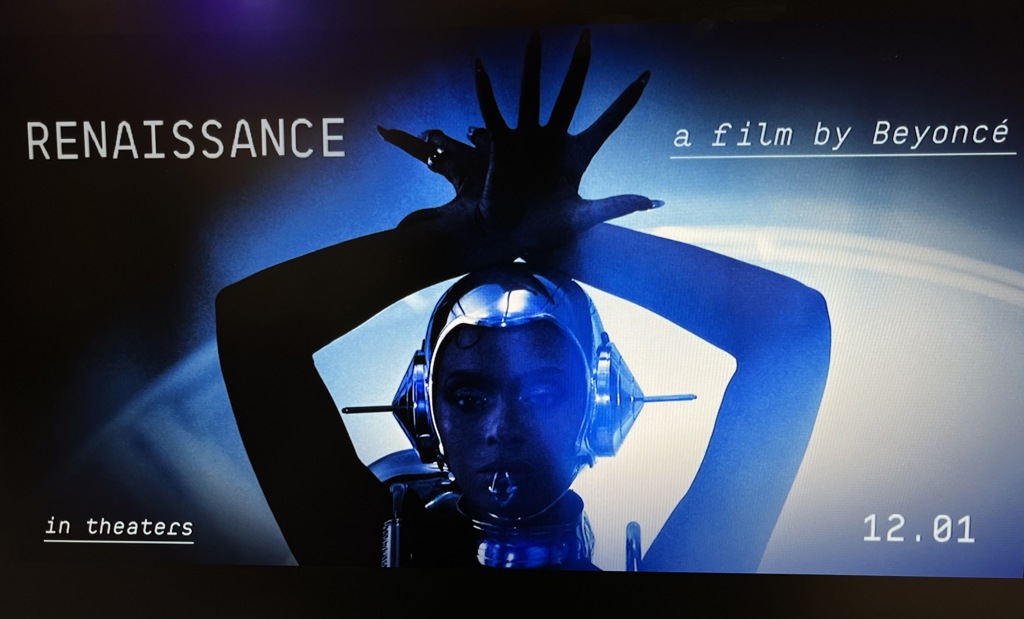The film confirms what we all know by now: Beyoncé’s only competition is herself.
Before being released in theatres on Dec. 1, Renaissance: A Film by Beyoncé was first teased after the Renaissance World Tour’s final show in Kansas City.
Beyoncé is commonly praised for her incorporation of visual content as a companion to her albums, most notably her film Lemonade. After teasing a music film (known by fans as “the visuals”) for her seventh album Renaissance last year, the artist did not release any cinematic content until the tour film’s announcement.
The film chronicles the tour from its beginning to end, containing footage from various shows. Behind-the-scenes segments addressing the tour’s construction from stage design to the philosophy of Renaissance are featured in clips between the concert footage. As the synthesis of a diverse catalogue of footage, the film is equally as insightful as it is engaging.
Much like my own experience witnessing the show in person, the film left me starstruck through its entirety. Beyoncé’s vocal mastery in the opening “Dangerously in Love” was as surreal in the film as it was in person. Amid my astonishment, I left the cinema with one feeling on my mind: freedom. Freedom from hatred; freedom from perfectionism; freedom from the standards I hold myself to. Witnessing an artist as big as Beyoncé champion multi-generational queerness is surreal all on its own.
On a technical level, the film is nothing short of extraordinary. Performances from various shows are seamlessly edited together during choreography, showcasing the vast array of handcrafted outfits. The sound is mixed to the quality of a studio album without sacrificing the noticeable rawness of Beyoncé’s live vocal capability. The concert’s choreography and interludes alone make for a visually enthralling experience. Because of the stage’s colossal size, three separate stages were used on tour to prepare for subsequent shows.
The recurring aesthetic of retro-futuristic technology leaves the impression of the stage being assembled as the show is happening. Crew members with silver jackets fittingly labelled “crew” scurry across stage to move props or capture footage. This approach could have faltered, but the raw euphoria and artistic refinement of the show makes the incorporation of the crew feel fitting.
As the name implies, Renaissance represents a rebirth for Beyoncé. In comparison to her previous tours and performances, the Renaissance World Tour feels like a release of tension fueled by her pursuit of perfection. Her charismatic stage presence feels effortless and relaxed. And unashamedly, it’s a treat to watch someone as legendary as Beyoncé laugh at her occasional mishaps.
Within the film’s documentary footage, Beyoncé extends the idea of rebirth to those close to her, namely her first-born daughter, Blue Ivy Carter. Beginning on May 26 during the concert in Paris, France, the 11-year-old joined the stage as a dancer for the performance of “My Power.” While initially believed to be Beyoncé’s idea, she later noted that it was her daughter’s idea to perform.
“She told me she was ready to perform, and I told her no,” Beyoncé says in the film.
Following her onstage debut, Carter encountered negative comments online surrounding her performance. In response to these, Carter chose to return to the stage stating “[she] will only get better from here.” Carter proceeded to perform at nine other shows, including the final.
Beyoncé ties in the idea of a renaissance to Carter’s newfound ambition. Amid her frustration with the criticism her daughter faced, she accepted her daughter’s decision to work diligently, fostering a welcoming environment with the other dancers.
Along with being a triumphant culmination of Beyoncé artistry, the soul of Renaissance lies in its love for queer culture. A segment of the film covers the influence of Beyoncé’s Uncle Johnny on her life before he succumbed to AIDS. Beyoncé dedicated the Renaissance album to him and mentions him in the track “HEATED.”
In the film’s third trailer, Beyoncé declares that “time is [her] only obstacle.” The entertainment industry notoriously subjects women to time’s arrow, filtering out women from the scene and allowing ageism to sweep many under the carpet. Beyoncé’s ability to maintain her solo career is dependent on her unrivaled work-ethic and continuous evolution.
Nothing in the film comes across as filler content. All aspects of the show’s conception feel rightfully addressed: the vast technical work invested into the stage’s design; the love letter to the queer founders of ballroom culture; the limitations Beyoncé has encountered at this stage of her career; and the exceptional footage archiving the tour. She has nothing to prove to anyone, her name is already written into history.
With this film, Renaissance crystallizes itself as more than just an immaculate dance album, but a cultural movement. It will be remembered for igniting a beacon of recognition for Black queer culture and serving as an inception for new pioneers.


